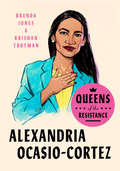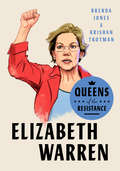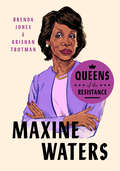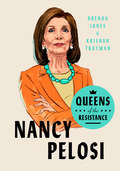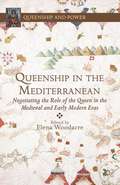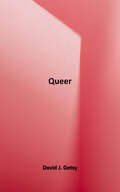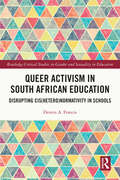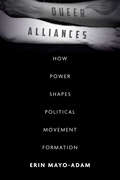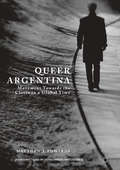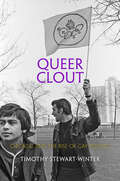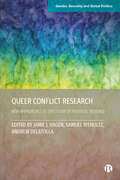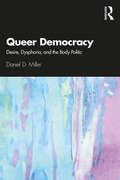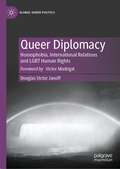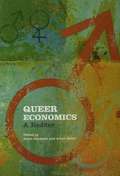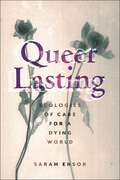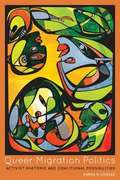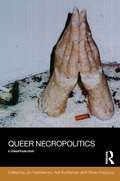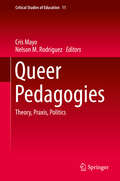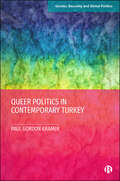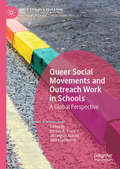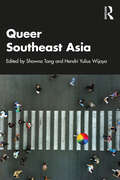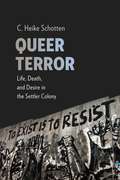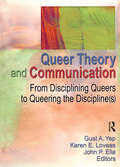- Table View
- List View
Queens of the Resistance: Alexandria Ocasio-Cortez (Queens of the Resistance)
by Brenda Jones Krishan TrotmanPart of the four-book Queens of the Resistance series, saluting some of the most beloved boss ladies in Congress: a celebration of AOC, the youngest woman ever to serve in Congress and its newest superstar Not long ago, no one could even imagine a twenty-eight-year-old Latina upstart running for Congress representing Queens and the Bronx: It required facing the city&’s nearly all-white, all-male political machine. But since Alexandria Ocasio-Cortez graced the scene in all her bartending, tweet-talking, mold-breaking glory, the face of politics in the twenty-first century has changed. Today, Ocasio-Cortez is a foremost advocate for progress, whipping up support among her colleagues and gaining the secret admiration of her foes. She&’s jousting with an outrageous president and a conservative media sphere that place her under relentless attack. Why? Because they fear her gift for speaking truth to power.With illustrations, deep research, and writing as endlessly quotable as she is, Queens of the Resistance pays tribute to this phenomenal woman. About the series: Each book of the Queens of the Resistance series is a celebration of the rebellion against the oppression of women and an embracement of the new in the United States government. The series is adorned with sass, discernment, and the badassery of the present and future leadership. The Doomsday Clock is at a minute to midnight, and the patriarchal power grid that lights &“the shining city on a Hill&” is about to black out. It&’s time to yield to the alternative—the power of women.
Queens of the Resistance: Elizabeth Warren (Queens of the Resistance)
by Brenda Jones Krishan TrotmanPart of the four-book Queens of the Resistance series, saluting some of the most beloved boss ladies in Congress: a celebration of Elizabeth Warren, the star senator from Massachusetts and 2020 presidential candidate All hail Queen Elizabeth! She's a &“queen" but not a monarch who's spent her life fighting to create a more equal society. Now one of the most recognizable women in politics, Warren took a winding road to become the badass senator from Massachusetts—the first woman senator ever elected from the state. Day-to-day struggle to make ends meet? Check. Single motherhood? Check. Law degree? Check. Tenured Harvard Law professor? You bet! And oh, she created a whole new government agency to protect consumers from predatory businesses. This the story of Liz&’s hard-earned rise to the top of the game.With illustrations, deep research, and writing as endlessly quotable as she is, Queens of the Resistance pays tribute to this phenomenal woman. About the series: Each book of the Queens of the Resistance series is a celebration of the rebellion against the oppression of women and an embracement of the new in the United States government. The series is adorned with sass, discernment, and the badassery of the present and future leadership. The Doomsday Clock is at a minute to midnight, and the patriarchal power grid that lights &“the shining city on a Hill&” is about to black out. It&’s time to yield to the alternative—the power of women.
Queens of the Resistance: Maxine Waters (Queens of the Resistance)
by Brenda Jones Krishan TrotmanPart of the four-book Queens of the Resistance series, saluting some of the most beloved boss ladies in Congress: a celebration of Representative Maxine Waters, who reclaimed her time and led the first calls for impeachment Maxine Waters is an icon for a generation of women powerbrokers in politics. She is an &“unbought and unbossed&” acolyte of all the legendary firebrands, like Shirley Chisholm, Barbara Jordan, Tupac, and Malcolm X. The daughter of a single mom from St. Louis, she&’s smart, sassy, and an outright firecracker. She is the first woman of color, and the first person of color, to regulate the boyz at the big banks as the powerful chair of the House Financial Services Committee. Auntie Maxine called out the crimes and corruption of this Oval Office with precision before anyone else dared to take a stand. Make no mistake, she is coming for the &“king,&” and whenever she aims, Maxine Waters doesn&’t miss. With illustrations, deep research, and writing as endlessly quotable as she is, Queens of the Resistance pays tribute to this phenomenal woman. About the series: Each book of the Queens of the Resistance series will be a celebration of the rebellion against the oppression of women and an embracement of the new in the United States government. The series is adorned with sass, discernment, and the badassery of the present and future leadership. The Doomsday Clock is at a minute to midnight, and the patriarchal power grid that lights &“the shining city on a Hill&” is about to black out. It&’s time to yield to the alternative—the power of women.
Queens of the Resistance: Nancy Pelosi (Queens of the Resistance)
by Brenda Jones Krishan TrotmanPart of the four-book Queens of the Resistance series, saluting some of the most beloved boss ladies in Congress: a celebration of the first woman Speaker of the House and a trailblazer for generations to come, Nancy Pelosi Behold one of the toughest dealers in the political arena, a singularly shrewd operator who cut her teeth from deep within the ranks of the Democratic Party and climbed all the way to the top. Rising higher than any woman ever who came before, Madame Speaker created a blueprint that those after her could follow. And now, back to her rightful place as Madame Speaker, she&’s prepared to take back power for the people . . . and at the end of it all, in characteristic class and style, she will pass on the gavel to the next generation of badass leaders.With illustrations, deep research, and writing as endlessly quotable as she is, Queens of the Resistance pays tribute to this phenomenal woman. About the series: Each book of the Queens of the Resistance series is a celebration of the rebellion against the oppression of women and an embracement of the new in the United States government. The series is adorned with sass, discernment, and the badassery of the present and future leadership. The Doomsday Clock is at a minute to midnight, and the patriarchal power grid that lights &“the shining city on a Hill&” is about to black out. It&’s time to yield to the alternative—the power of women.
Queenship In The Mediterranean
by Elena WoodacreThis groundbreaking collection explores the key roles that Mediterranean queens played as wives, as mothers, and above all as political actors. Ranging from Byzantine empresses to regnants and consorts in the Italian peninsula, they offer a bracing new perspective queenship in the medieval and Early Modern eras.
Queenship and Voice in Medieval Northern Europe
by William Layher"Queenship and Voice in Medieval Northern Europe" offers a unique perspective on aspects of female rulership in the Scandinavian Middle Ages. Working with historical as well as literary evidence from the thirteenth to fifteenth centuries, this book shows how three queens - Agnes of Denmark, Eufemia of Norway, and Margareta, the union queen of the Scandinavian kingdoms - marshaled the power of the royal voice in order to effect political change. In conceptualizing the political landscape of late-medieval Scandinavia as an acoustic landscape, Layher charts a new path of historical and cultural analysis into the reach and resonance of royal power in the Middle Ages.
Queer (Whitechapel: Documents of Contemporary Art)
by David J. GetsyKey artists' writings that have influenced and catalyzed contemporary queer artistic practice. <p><p>Historically, “queer” was the slur used against those who were perceived to be or made to feel abnormal. Beginning in the 1980s, “queer” was reappropriated and embraced as a badge of honor. While queer draws its politics and affective force from the history of non-normative, gay, lesbian, and bisexual communities, it is not equivalent to these categories, nor is it an identity. Rather, it offers a strategic undercutting of the stability of identity and of the dispensation of power that shadows the assignment of categories and taxonomies. Artists who identify their practices as queer today call forth utopian and dystopian alternatives to the ordinary, adopt outlaw stances, embrace criminality and opacity, and forge unprecedented kinships, relationships, loves, and communities. <p><p>Rather than a book of queer theory for artists, this is a book of artists' queer tactics and infectious concepts. By definition, there can be no singular “queer art.” Here, in the first Documents of Contemporary Art anthology to be centered on artists' writings, numerous conversations about queer practice are brought together from diverse individual, social and cultural contexts. Together these texts describe and examine the ways in which artists have used the concept of queer as a site of political and institutional critique, as a framework to develop new families and histories, as a spur to action, and as a basis from which to declare inassimilable difference. <p><p>Artists and writers include <p><p>Nayland Blake, Gregg Bordowitz, Leigh Bowery, AA Bronson, A. K. Burns, Giuseppe Campuzano, Tee Corinne, Barbara DeGenevieve, Dyke Action Machine!, Elmgreen & Dragset, Rotimi Fani-Kayode, Simon Fujiwara, Malik Gaines, Felix Gonzalez-Torres, Gran Fury, Sunil Gupta, Hahn Thi Pham, Harmony Hammond, Sharon Hayes, Hudson, Roberto Jacoby, Derek Jarman, Isaac Julien, Mahmoud Khaled, Zoe Leonard, Lesbian Avengers, Catherine Lord, Ma Liuming, LTTR, Allyson Mitchell, Zanele Muholi, Carlos Motta, Ocaña, Hélio Oiticica, Catherine Opie, Ridykeulous (Nicole Eisenman & A.L. Steiner), Marlon Riggs, Emily Roysdon, Prem Sahib, Assoto Saint, Tejal Shah, Amy Sillman, Jack Smith, Wolfgang Tillmans, Toxic Titties, Danh Vo, David Wojnarowicz, Wu Tsang, Yan Xing, Las Yeguas del Apocalipsis, Akram Zaatari, Sergio Zevallos
Queer Activism in South African Education: Disrupting Cis(hetero)normativity in Schools (Routledge Critical Studies in Gender and Sexuality in Education)
by Dennis A. FrancisOffering a vital, critical contribution to debates on gender, sexuality and schooling in South Africa, this book highlights how South African educational practices, discourses and structures normalize cisheteronormativity, along with how these are resisted within schools and through contemporary forms of activism. Not only does it add fresh insights to the existing research literature on gender, sexualities and schooling, it also underscores the valuable contributions of queer and transgender social movements, which have made influential legislative, teaching, learning and support contributions to education. Drawing on ethnographic research with queer and transgender activists, teachers, school managers, parents and school attending youth, the book provides everyday real-life quotes and observations offering a deeply critical contribution to the debates on gender and sexualities, education and activism. Using spatial and affect theories, it troubles the assumptions that frame this field of research to make a novel contribution to the national and international literature and research. The book provides research-based insights for thinking about and calls for informed action to challenging cisheteronormativity within and beyond schools.
Queer Alliances: How Power Shapes Political Movement Formation
by Erin Mayo-AdamA unique investigation into how alliances form in highly polarized times among LGBTQ, immigrant, and labor rights activists, revealing the impacts within each rights movement. Queer Alliances investigates coalition formation among LGBTQ, immigrant, and labor rights activists in the United States, revealing how these new alliances impact political movement formation. In the early 2000s, the LGBTQ and immigrant rights movements operated separately from and, sometimes, in a hostile manner towards each other. Since 2008, by contrast, major alliances have formed at the national and state level across these communities. Yet, this new coalition formation came at a cost. Today, coalitions across these communities have been largely reluctant to address issues of police brutality, mass incarceration, economic inequality, and the ruthless immigrant regulatory complex. Queer Alliances examines the extent to which grassroots groups bridged historic divisions based on race, gender, class, and immigration status through the development of coalitions, looking specifically at coalition building around expanding LGBTQ rights in Washington State and immigrant and migrant rights in Arizona. Erin Mayo-Adam traces the evolution of political movement formation in each state, and shows that while the movements expanded, they simultaneously ossified around goals that matter to the most advantaged segments of their respective communities. Through a detailed, multi-method study that involves archival research and in-depth interviews with organization leaders and advocates, Queer Alliances centers local, coalition-based mobilization across and within multiple movements rather than national campaigns and court cases that often occur at the end of movement formation. Mayo-Adam argues that the construction of common political movement narratives and a shared core of opponents can help to explain the paradoxical effects of coalition formation. On the one hand, the development of shared political movement narratives and common opponents can expand movements in some contexts. On the other hand, the episodic nature of rights-based campaigns can simultaneously contain and undermine movement expansion, reinforcing movement divisions. Mayo-Adam reveals the extent to which inter- and intra-movement coalitions, formed to win rights or thwart rights losses, represent and serve intersectionally marginalized communities—who are often absent from contemporary accounts of social movement formation.
Queer Argentina
by Matthew J. EdwardsThrough insightful, high-paced commentary this book directs attention south, towards Argentina. Current events, political debates, and the cultural production of artists, authors and public figures, including C#65533;sar Aira, Mar#65533;a Moreno, Naty Menstrual and Copi, among others, provide case studies where heterosexual social models are rejected and, in their place, queer frameworks become the preferred model for living differently. Queer Argentina traces the movements of today's marginalized communities as they pass through and choose to remain within the closet: a space that is emblematic of collective struggles in silence and community formation outside the (hetero)norm.
Queer Clout: Chicago and the Rise of Gay Politics
by Timothy Stewart-WinterIn postwar America, the path to political power for gays and lesbians led through city hall. By the late 1980s, politicians and elected officials, who had originally sought political advantage from raiding gay bars and carting their patrons off to jail, were pursuing gays and lesbians aggressively as a voting bloc—not least by campaigning in those same bars. Gays had acquired power and influence. They had clout.<P><P> Tracing the gay movement's trajectory since the 1950s from the closet to the corridors of power, Queer Clout is the first book to weave together activism and electoral politics, shifting the story from the coastal gay meccas to the nation's great inland metropolis. Timothy Stewart-Winter challenges the traditional division between the homophile and gay liberation movements, and stresses gay people's and African Americans' shared focus on police harassment. He highlights the crucial role of black civil rights activists and political leaders in offering white gays and lesbians not only a model for protest but also an opening to join an emerging liberal coalition in city hall. The book draws on diverse oral histories and archival records spanning half a century, including those of undercover vice and police red squad investigators, previously unexamined interviews by midcentury social scientists studying gay life, and newly available papers of activists, politicians, and city agencies.<P> As the first history of gay politics in the post-Stonewall era grounded in archival research, Queer Clout sheds new light on the politics of race, religion, and the AIDS crisis, and it shows how big-city politics paved the way for the gay movement's unprecedented successes under the nation's first African American president.
Queer Conflict Research: New Approaches to the Study of Political Violence
by Jamie J. Hagen, Samuel Ritholtz and Andrew DelatollaBringing together a team of international scholars, this volume provides a foundational guide to queer methodologies in the study of political violence and conflict. Contributors provide illuminating discussions on why queer approaches are important, what they entail and how to utilise a queer approach to political violence and conflict. The chapters explore a variety of methodological approaches, including fieldwork, interviews, cultural analysis and archival research. They also engage with broader academic debates, such as how to work with research partners in an ethical manner. Including valuable case studies from around the world, the book demonstrates how these methods can be used in practice. It is the first critical, in-depth discussion on queer methods and methodologies for research on political violence and conflict.
Queer Democracy: Desire, Dysphoria, and the Body Politic
by Daniel D. MillerQueer Democracy undertakes an interdisciplinary critical investigation of the centuries-old metaphor of society as a body, drawing on queer and transgender accounts of embodiment as a constructive resource for reimagining politics and society. Daniel Miller argues that this metaphor has consistently expressed a desire for social and political order, grounded in the social body’s imagined normative shape or morphology. The consistent result, from the “concord” discourses of the pre-Christian Stoics, all the way through to contemporary nationalism and populism, has been the suppression of any dissent that would unmake the social body’s presumed normativity. Miller argues that the conception of embodiment at the heart of the metaphor is a fantasy, and that negative social and political reactions to dissent represent visceral, dysphoric responses to its reshaping of the social body. He argues that social body’s essential queerness, defined by fluidity and lack of a fixed morphology, spawns queer democracy, expressed through ongoing social and political practices that aim to extend liberty and equality to new social domains. Queer Democracy articulates a new departure for the ongoing development of theoretical articulations linking queer and trans theory with political theory. It will appeal to both academic and non-academic readers engaged in research on political theory, populism, US religion, gender studies, and queer studies.
Queer Diplomacy: Homophobia, International Relations and LGBT Human Rights (Global Queer Politics)
by Douglas Victor JanoffThis book is the first study of multilateral LGBT human rights diplomacy viewed from the perspective of its practitioners: diplomats, LGBT activists, human rights experts and multilateral specialists. It demonstrates how diplomats and advocates work to promote LGBT rights on the world stage, often using Western constructs of sexual and gender identity. In turn, these efforts have triggered conflict and polarization: opposing states often deploy cultural, religious and moral discourses to minimize LGBT rights as a “legitimate” human right. The author, a seasoned Canadian foreign service officer, human rights negotiator and former community activist and researcher, uses insider perspectives to critically assess both bilateral and multilateral diplomatic engagement on LGBT human rights issues. Janoff’s research involved participation in UN meetings in Geneva and New York and 29 interviews with diplomats, human rights advocates and experts, and representatives from the UN and other inter-governmental organizations. Although LGBT issues have been mainstreamed into many areas of bilateral and multilateral human rights policy, his research found a considerable gap: a coordinated diplomatic and civil society approach is needed to more effectively address ongoing human rights violations against LGBT people around the world.
Queer Economics: A Reader
by Joyce Jacobsen Adam ZellerAn important new book, bringing together into one volume many of the salient early articles in the field as well as important recent contributions, this reader is an examination of and response to the effects of heteronormativity on both economic outcomes and economics as a discipline. The first book to consolidate what has been published, filling a gap in the currently available literature and edited by an expert in the field, it contains a brief introductory essay; setting-out the reasons for and aims of the project, and a short section introduction; defining the topic at hand and introducing each of the key readings. This book is necessary reading for students in research areas including political economy, urban studies, economics, economic history and demographic economics.
Queer Forms
by Ramzi FawazHow do we represent the experience of being a gender and sexual outlaw? In Queer Forms, Ramzi Fawaz explores how the central values of 1970s movements for women’s and gay liberation—including consciousness-raising, separatism, and coming out of the closet—were translated into a range of American popular culture forms. Throughout this period, feminist and gay activists fought social and political battles to expand, transform, or wholly explode definitions of so-called “normal” gender and sexuality. In doing so, they inspired artists, writers, and filmmakers to invent new ways of formally representing, or giving shape to, non-normative genders and sexualities. This included placing women, queers, and gender outlaws of all stripes into exhilarating new environments—from the streets of an increasingly gay San Francisco to a post-apocalyptic commune, from an Upper East Side New York City apartment to an all-female version of Earth—and finding new ways to formally render queer genders and sexualities by articulating them to figures, outlines, or icons that could be imagined in the mind’s eye and interpreted by diverse publics. Surprisingly, such creative attempts to represent queer gender and sexuality often appeared in a range of traditional, or seemingly generic, popular forms, including the sequential format of comic strip serials, the stock figures or character-types of science fiction genre, the narrative conventions of film melodrama, and the serialized rhythm of installment fiction. Through studies of queer and feminist film, literature, and visual culture including Mart Crowley’s The Boys in the Band (1970), Armistead Maupin’s Tales of the City (1976–1983), Lizzy Borden’s Born in Flames (1983), and Tony Kushner’s Angels in America (1989–1991), Fawaz shows how artists innovated in many popular mediums and genres to make the experience of gender and sexual non-conformity recognizable to mass audiences in the modern United States.Against the ideal of ceaseless gender and sexual fluidity and attachments to rigidly defined identities, Queer Forms argues for the value of shapeshifting as the imaginative transformation of genders and sexualities across time. By taking many shapes of gender and sexual divergence we can grant one another the opportunity to appear and be perceived as an evolving form, not only to claim our visibility, but to be better understood in all our dimensions.
Queer Lasting: Ecologies of Care for a Dying World (Sexual Cultures)
by Sarah EnsorWhat queer modes of resilience and care can teach us about enduring environmental collapseWhat does it mean to live at the end of life, the end of a family line, the end of a species, or the end of the future itself? When faced with unfurling catastrophes, environmentalists often limit the conversation by focusing on the future. Activists work for the welfare of future generations, while scientists labor over projections of future outcomes. In Queer Lasting, Sarah Ensor asks what this emphasis on the future makes unthinkable. She looks to queer scenes of futurelessness to consider what ecocriticism can learn from queer theory, which imagines and inhabits the immanent ethical possibilities of a terminal present. While living “at the last” is often a terrifying prospect, queer culture reminds us that “to last” is itself also one way to go on. Defining queerness as a mode of collective life in which these paradigms of lasting—ending and persisting—are constitutively intertwined, Ensor turns to two periods of queer extinction for models of care, continuance, and collective action predicated on futurelessness: the 1890s, in which existing forms of erotic affiliation were extinguished through the binary of homo/heterosexuality, and the 1980s, in which the spread of the AIDS epidemic threatened the total loss of gay lives and of specific erotic ways of life. Through readings that trace unexpected formal resonances across the works of Sarah Orne Jewett, Willa Cather, Melvin Dixon, Essex Hemphill, Allen Barnett, and Samuel Delany, Queer Lasting maintains that queer writing, in its intimacy with death and loss, offers a rich archive for imagining new ways of thinking through environmental collapse. Whether confronting the epidemic contours of the AIDS crisis, theorizing the temporary encounters of cruising, or reckoning with the lives of non-reproductive subjects, this book about futurelessness is also a book about persistence. It demonstrates how, far from giving up in the face of the terminal paradigms that environmentalism fears, queer culture has instead predicated its living—and its lasting—upon them.
Queer Migration Politics: Activist Rhetoric and Coalitional Possibilities
by Karma R. ChavezDelineating an approach to activism at the intersection of queer rights, immigration rights, and social justice, Queer Migration Politics examines a series of "coalitional moments" in which contemporary activists discover and respond to the predominant rhetoric, imagery, and ideologies that signal a sense of national identity. Karma Chávez analyzes how activists use coalition to articulate the shared concerns of queer politics and migration politics, as both populations seek to imagine their ability to belong in various communities and spaces, their relationships to state and regional politics, and their relationships to other people whose lives might be very different from their own. Advocating a politics of the present and drawing from women of color and queer of color theory, this book contends that coalition enables a vital understanding of how queerness and immigration, citizenship and belonging, and inclusion and exclusion are linked. Queer Migration Politics offers activists, queer scholars, feminists, and immigration scholars productive tools for theorizing political efficacy.
Queer Necropolitics: Queer Necropolitics (Social Justice)
by Adi Kuntsman Jin Haritaworn Silvia PosoccoThis book comes at a time when the intrinsic and self-evident value of queer rights and protections, from gay marriage to hate crimes, is increasingly put in question. It assembles writings that explore the new queer vitalities within their wider context of structural violence and neglect. Moving between diverse geopolitical contexts – the US and the UK, Guatemala and Palestine, the Philippines, Iran and Israel – the chapters in this volume interrogate claims to queerness in the face(s) of death, both spectacular and everyday. Queer Necropolitics mobilises the concept of ‘necropolitics’ in order to illuminate everyday death worlds, from more expected sites such as war, torture or imperial invasion to the mundane and normalised violence of racism and gender normativity, the market, and the prison-industrial complex. Contributors here interrogate the distinction between valuable and pathological lives by attending to the symbiotic co-constitution of queer subjects folded into life, and queerly abjected racialised populations marked for death. Drawing on diverse yet complementary methodologies, including textual and visual analysis, ethnography and historiography, the authors argue that the distinction between ‘war’ and ‘peace’ dissolves in the face of the banality of death in the zones of abandonment that regularly accompany contemporary democratic regimes. The book will appeal to activist scholars and students from various social sciences and humanities, particularly those across the fields of law, cultural and media studies, gender, sexuality and intersectionality studies, race, and conflict studies, as well as those studying nationalism, colonialism, prisons and war. It should be read by all those trying to make sense of the contradictions inherent in regimes of rights, citizenship and diversity.
Queer Pedagogies: Theory, Praxis, Politics (Critical Studies of Education #11)
by Nelson M. Rodriguez Cris MayoThis book invites readers to explore the critical interruptions occasioned by queer pedagogies. Building on earlier scholarly work in this area, as well as pedagogical production arising out of queer activism, the chapters in this volume examine a broad range of themes as they collectively grapple with the meaning and practice of queer pedagogy across different contexts. In this way, Queer Pedagogies provides a glance at new ways of thinking about and acting on contemporary educational topics and debates situated at the intersection of queer studies and education. In taking up the concept of queer pedagogy, the volume provides ample opportunities for scholars, educators, activists, and other cultural workers to critically engage with ongoing questions of theory, praxis, and politics.
Queer Politics in Contemporary Turkey (Gender, Sexuality and Global Politics)
by Paul Gordon KramerDrawing on the words and stories of queer Turkish activists, this book aims to unravel the complexities of queer lives in Turkey. In doing so, it challenges dominant conceptualizations of the queer Turkish experience within critical security discourses. The book argues that while queer Turks are subjected to ceaseless forms of insecurity in their governance, opportunities for emancipatory resistance have emerged alongside these abuses. It identifies the ways in which the state, the family, Turkish Islam and other socially-mediated processes and agencies can expose or protect queers from violence in the Turkish community.
Queer Social Movements and Outreach Work in Schools: A Global Perspective (Queer Studies and Education)
by Dennis A. Francis Jón Ingvar Kjaran Jukka LehtonenThis book brings together leading scholars researching the field of gender, sexuality, schooling, queer activism, and social movements within different cultural contexts. With contributions from more than fifteen countries, the chapters bring fresh insights for students and scholars of gender and sexuality studies, education, and social movements in the Global North and South. The book draws together both theoretical and empirical contributions offering rich and multidisciplinary essays from scholars and activists in the field focusing on outreach work of QSM (Queer Social Movements) in schools, queer activism in educational settings, and the role of QSMs in supporting and informing queer youth.
Queer Southeast Asia
by Shawna Tang and Hendri Yulius WijayaTang and Wijaya present a range of new and established scholarly voices, including local activists directly involved in developments in Southeast Asia. This groundbreaking collection presents the current state of play and longstanding LGBTQ+ debates in this often-overlooked region of Asia. The diversity of both the subject and the region is reflected in the broad scope of topics addressed, from the impact of Japanese queer popular culture on queer Filipinos, to the politics of public toilets in Singapore, and the impact of digital governance on queer communities across ASEAN. Taken in combination, these investigations not only highlight the operations of queer politics in Southeast Asia, but also present a concrete basis to reflect on queer knowledge production in the region. A vital resource for students and scholars of gender and sexuality in Southeast Asia, or any Queer or LGBTQ+ studies looking beyond the West.
Queer Terror: Life, Death, and Desire in the Settler Colony (New Directions in Critical Theory #59)
by C. Heike SchottenAfter Sept. 11, 2001, George W. Bush declared, “Either you are with us, or you are with the terrorists.” Bush’s assertion was not simply jingoist bravado—it encapsulates the civilizationalist moralism that has motivated and defined the United States since its beginning, linking the War on Terror to the nation’s settlement and founding.In Queer Terror, C. Heike Schotten offers a critique of U.S. settler-colonial empire that draws on political, queer, and critical indigenous theory to situate Bush’s either/or moralism and reframe the concept of terrorism. The categories of the War on Terror exemplify the moralizing politics that insulate U.S. empire from critique, render its victims deserving of its abuses, and delegitimize resistance to it as unthinkable and perverse. Schotten provides an anatomy of this moralism, arguing for a new interpretation of biopolitics that is focused on sovereignty and desire rather than racism and biology. This rethinking of biopolitics puts critical political theory of empire in dialogue with the insights of both native studies and queer theory. Building on queer theory’s refusal of sanctity, propriety, and moralisms of all sorts, Schotten ultimately contends that the answer to Bush’s ultimatum is clear: dissidents must reject the false choice he presents and stand decisively against “us,” rejecting its moralism and the sanctity of its “life,” in order to further a truly emancipatory, decolonizing queer politics.
Queer Theory and Communication: From Disciplining Queers to Queering the Discipline(s)
by Gust YepGet a queer perspective on communication theory! Queer Theory and Communication: From Disciplining Queers to Queering the Discipline(s) is a conversation starter, sparking smart talk about sexuality in the communication discipline and beyond. Edited by members of "The San Francisco Radical Trio," the book integrates current queer theory, research, and interventions to create a critical lens with which to view the damaging effects of heteronormativity on personal, social, and cultural levels, and to see the possibilities for change through social and cultural transformation. Queer Theory and Communication represents a commitment to positive social change by imagining different social realities and sharing ideas, passions, and lived experiences. As the communication discipline begins to recognize queer theory as a vital and viable intellectual movement equal to that of Gay and Lesbian studies, the opportunity is here to take current queer scholarship beyond conference papers and presentations. Queer Theory and Communication has five objectives: 1) to integrate and disseminate current queer scholarship to a larger audience-academic and nonacademic; 2) to examine the potential implications of queer theory in human communication theory and research in a variety of contexts; 3) to stimulate dialogue among queer scholars; 4) to set a preliminary research agenda; and 5) to explore the implications of the scholarship in cultural politics and personal empowerment and transformation. Queer Theory and Communication boasts an esteemed panel of academics, artists, activists, editors, and essayists. Contributors include: John Nguyet Erni, editor of Asian Media Studies and Research & Analysis Program Board member for GLAAD Joshua Gamson, author of Freaks Talk Back: Tabloid Talk Shows and Sexual Nonconformity Sally Miller Gerahart, author, activist, and actress Judith Halberstam, author of Female Masculinity David M. Halperin, author of How to Do the History of Homosexuality E. Patrick Johnson, editor of Black Queer Studies Kevin Kumashiro, author of Troubling Education: Queer Activism and Antioppressive Pedagogy Thomas Nakayama, co-editor of Whiteness: The Communication of Social Identity A. Susan Owen, author of Bad Girls: Cultural Politics and Media Representations of Transgressive Women William F. Pinar, author of Autobiography, Politics, and Sexuality, and editor of Queer Theory in Education Ralph Smith, co-author of Progay/antigay: The Rhetorical War over Sexuality Queer Theory and Communication: From Disciplining Queers to Queering the Discipline(s) is an essential addition to the critical consciousness of anyone involved in communication, media studies, cultural studies, gender studies, and the study of human sexuality, whether in the classroom, the boardroom, or the bedroom.
